 |
An interview with the director
How did you come to make this film?
I was feeling bad after the first psychoses, but I didn't know exactly how bad—loosely speaking, I thought I won’t make it. I wanted to fight using my own means and began to record interviews with myself. I was pretty sure that it could be used to make a film one day. But it took a long time—a total of eight years—until the film was finished.
Where does the title come from?
My boyfriend at the time of the first psychosis said to me at some point, "It's all like a cold in the head, it'll pass." Even if the title maybe sounds cute for something very heavy and daunting, it also reflects the idea of dealing with it as something normal, like a cold.
How did you choose the people from whom you wanted a video letter?
My family is used to me picking personal topics to talk about larger issues. In the film about my father, "East… West… Home's Best" (1992), I already asked my family to appear on screen and in interviews. Now some friends have been added. It's not an easy decision to take part in a film and to speak openly, and I'm very grateful for their efforts. The video letters and conversations add context to the story and give depth to the thoughts regarding the issue. In a video letter, one inevitably talks of oneself as well as to the addressee. That's something that interested me very much in this project.
The film is dedicated to your mother. Why doesn't she appear in the film?
My mother's been just great during the last 14 years. She's the secret hero of this story. Her grown-up daughter, at 30, suddenly became so ill that it was no longer possible to see how life would go on. She took care of me during the crises and made sure that I could stay as free and independent as possible between the mills of the health insurance, unemployment benefits and so forth. But I wasn't ill all the time. Many years actually passed in a very toned down and hampered atmosphere, with the meds. When I asked my mother whether she would be in this film, she gave a simple answer: "I live a real life with you—I don't want to destroy that." I respected it, so I didn't force her to appear in front of the camera just for considerations of the film.
In the film, you reach way back into your personal archives. How did this discovery come about?
It was clear to me that I was making a film about the psychotic illness from the inside out. I had a lot of self-interviews and conversations with friends, video letters. Then I realized that it's important to show who the person is that's struggling with the illness and trying to put everything into words. Since I began making films at 18, I've been in my films. Initially I acted, but since 1991 I've worked with autobiographical moments and stories. So from my archives, I could select that which closely shows me as a person. The staged video diary from the fragment "A Woman and her Double Bass" is fantastic in doing this. They're shots that were made two years before my first breakdown. I'm acting out the video diary, but I present myself in such a way that you can get goose bumps—like a forewarning of the psychosis?
Why is the film bilingual, in German and English and with Hungarian sections?
It's an unusual decision to say that you're going to make a film about yourself. The work is always difficult, accompanied by doubts about how you're presenting yourself. In this case, to talk about psychoses, I found it the most honest to begin with myself and to tell what happened. There's something radical about focusing strictly on yourself. In the film I speak German and English because I'm bilingual, I feel at home with both languages. It's my intention to show both facets of my person, which grew up in two cultures. Beyond that, all video correspondents speak in the language of their choice. During the conversations we sometimes speak German, sometimes English, depending on whom I'm talking with and what our common language is.
What do the segments with images and music signify for you?
I decided that I didn't want to translate the visual experience of the psychotic states into scenes. Since experiences like that are comparable to the sensation when you're on hash or cocaine, I found a low budget attempt to visualize them probably wouldn't work. I conceived the experimental image sequences with music together with Dieter Vervuurt. We wanted to create reduced, clear and concentrated situations—to tell about my past on the one hand and to also express the inner emotional state of mind. They're fragments, or splinters, that provide a glance. Silvia Ruszev developed the design and visual effects of these interludes with music in the editing. We shot the studio scenes at different times, some in 2008 and the rest in 2009.
For these scenes we used several tracks from the CD "Propellers in Love" by Arnold Dreyblatt. For me, the music of the 1980s combines well with the experimental images and it also evokes the period when I came back to Germany from Canada in 1985. The music of Sean Scruff Newton in the Canada sequence is a song that he wrote for me back when we were roommates, when I was 17/18. It's about how there is pasta at our place tonight—a little joke, because at that time I really did cook pasta every day. The closing music, by the violinist Felix Lajko, is reminiscent of the period in the early 1990s that I talk about in the video diary, when I was underway all the time and became acquainted with his music at a festival in Hungary.
What are you planning to do next?
Last year I made an autobiographical film using my text archives. It's an experimental video piece, a photo film with extracts from unsent love letters. This year I'm going to start a similar project that doesn't look into the archive but rather creates a new personal archive. As of my birthday on March 5th, 2010, I'm going to upload one-minute video postcards of my life onto YouTube every day. It's a diary postcard project that'll run for one year. The title is: "Wish You Were Here".
Interview conducted by Michael Höfner.
|
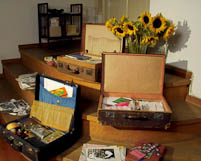
Head Cold

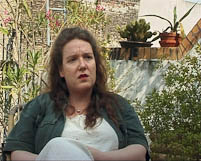 Head Cold
Head Cold

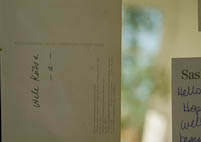
Head Cold

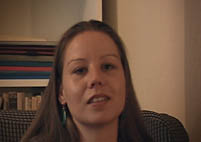 Head Cold
Head Cold

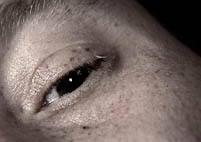
Head Cold

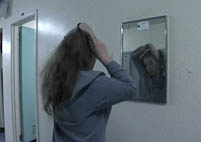 Head Cold
Head Cold

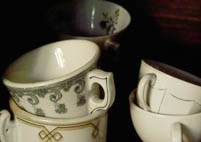 Head Cold Head Cold

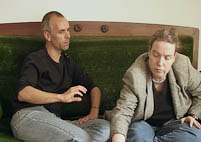 Head Cold Head Cold

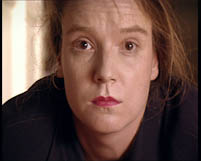 Head Cold Head Cold
 |



 Head Cold
Head Cold 
 Head Cold
Head Cold 
 Head Cold
Head Cold  Head Cold
Head Cold  Head Cold
Head Cold  Head Cold
Head Cold